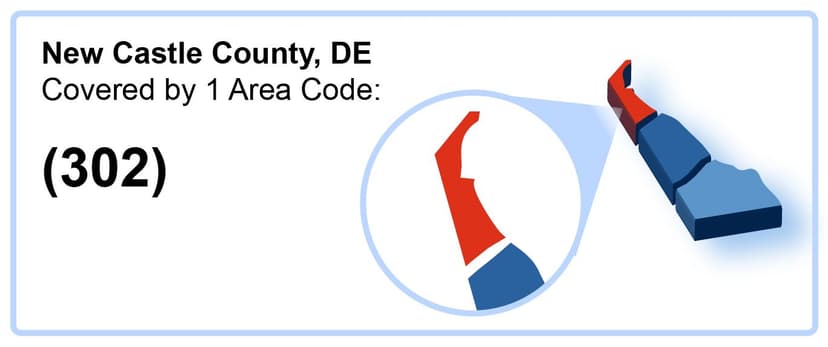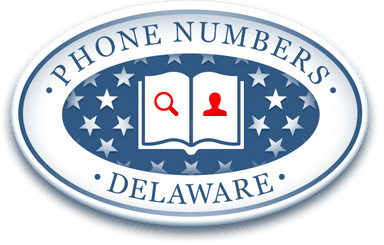What are New Castle County Area Codes?

Area codes are the three numeric digits that start 10-digit telephone numbers in North America. The North American Numbering Plan (NANP) divided the different telephone service territories into numbering plan areas (NPAs) and designated an area code to identify each NPA. The Delaware Public Service Commission implements and manages area codes in New Castle County.
There is only one area code for New Castle County and the entire State of Delaware.
Area Code 302
Area code 302 is the only telephone area code for the State of Delaware. It was one of the original area codes established in 1947 under the NANP. Cities and towns in New Castle County covered by this NPA include Ardentown, Bellefonte, Delaware City, Elsmere, Middletown, New Castle, Newark, Newport, Odessa, Townsend, and Wilmington.
What are the Best Cell Phone Plans in New Castle County?
Telephony service preferences of Delaware residents have shifted from landlines to wireless services in the recent past. A 2018 National Health Interview Survey report by the CDC supports this conclusion. The survey reported that 45.9% of adults and 55.9% of children in households in the state exclusively used wireless telephony services. In contrast, only about 4% of adults and 1% of children relied solely on landlines for their telecommunication needs.
The State of Delaware enjoys exceptional coverage from the major telephone carriers. All four major networks are present in the state and provide excellent services, though service may be tricky along the Delaware River. AT&T claims 100% coverage while Verizon and T-Mobile cover over 96% of the population. Sprint lags behind the other networks but still provides about 94% coverage in the state. Several Mobile Virtual Network Operators (MNVOs) leverage the major carriers’ infrastructure to offer cheaper phone plans.
VoIP services are available to New Castle County residents from numerous service providers for both business and residential users. Voice over Internet Protocol (VoIP) uses broadband internet connections to render telephony services that are cheaper, more flexible, and more efficient than traditional telephony services.
What are New Castle County Phone Scams?
These are phone scams that target residents of New Castle County. Phone scams are fraudulent acts committed with the aim of stealing money and deceptively obtaining confidential information using live calls, robocalls, and text messages. Phone number lookup services can identify telephone numbers used to run phone scams in New Castle County.
The Office of the Delaware Attorney General enforces consumer protection statutes and provides resources to help residents avoid scams. Residents can contact the AG’s Office on (302) 577-8600 or (800) 220-5424 or submit complaints online or by email. Victims of phone scams in New Castle County can also file reports with the New Castle County Police Department and their municipal police departments.
Some common phone scams in New Castle County include:
What are Arrest Warrant Scams?
Scammers impersonate officers of local law enforcement agencies in the county, such as the New Castle County Police Department (NCCPD), and target county residents. They usually have the targets’ names and call with local numbers. The callers contact unsuspecting residents to inform them that they or their family members have active warrants out for their arrests. They ask the targets to pay off the warrants to prevent them from being executed and the arrests made. The callers insist on the payments by prepaid gift cards or arrange to meet the victims outside the police station to collect cash payments.
The NCCPD warns residents that no law enforcement agency will ever contact them to warn about active warrants or request payment to prevent warrant executions. Law enforcement agencies will also never ask for payment by prepaid cards or such irregular methods. Residents who receive these calls should hang up immediately. Victims of these scams should report them to the NCCPD at (302) 573-2800 or their local police departments.
What are Jury Duty Scams?
These are scams wherein the scammers contact residents and pretend to be New Castle County Sheriff deputies or officers of the NCCPD. They inform their targets that they missed jury duty and bench warrants were issued for their arrests that can only be rescinded if they pay fines. The scammers ask for payments by gift cards and prepaid debit cards, or arrange to meet the victims outside the courthouses to collect cash. Alternatively, they ask for the victims’ credit card information.
The New Castle County Sheriff’s Office (NCCSO) warns residents that neither it nor the NCCPD will ever contact them on such matters. They will never threaten residents with arrest or ask for payment via prepaid cards or gift cards to clear warrants. Neither will they ever ask for confidential information over phone calls. Residents are advised never to provide information to such callers or agree to meetings. Contact the NCCSO on (302) 395-8450 to verify and report such calls. Residents can also report these calls to the NCCPD at (302) 573-2800 or contact their local police departments. Reverse phone number searches can shed some light on the phone numbers used for these scams.
What are IRS Scams?
These scams occur all-year round but are most prevalent during tax season when communication with the IRS is expected. Scammers, impersonating the Internal Revenue Service (IRS) agents, call residents to inform them of unpaid taxes and demand immediate payment. They spoof caller IDs to indicate the calls are from the IRS and usually have information about the targets that they likely garnered from social media. The callers insist on payment via prepaid debits cards and wire transfers.
Hesitant targets are coerced with threats of punitive actions to gain their compliance. These include threats of arrests, prosecutions, deportations, and closing down their businesses. In a variation of this scam, the callers inform the victims that they are due tax refunds and request personal information, which they use to steal identities.
The IRS informs residents that it will always initiate contact with taxpayers via mail and never contact them by phone without prior notification. The IRS will not demand immediate payment for back taxes, as taxpayers are allowed to appeal tax debts, and cannot threaten taxpayers with arrests. The IRS will also never request payments via irregular methods or solicit personal details on phone calls. Phone number lookup applications can obtain information about the phone numbers used for tax scams. Residents who have been victims of these scams can report to the Treasury Inspector General on 1 (800) 366-4484 or their local police departments.
What are Robocalls and Spam Calls?
Robocalls are telephone calls made with autodialers and preset to deliver prerecorded messages to the recipients. Robocalls are mainly associated with telemarketing and political campaigns and are also used to make public service and emergency announcements. They can deliver messages to multiple consumers with no human intervention, and this has attracted scammers.
Scammers use robocalls to target residents covertly and this makes it easier to pull off their schemes. Consumers are used to receiving robocalls from legitimate entities and are more likely to respond to them than to live calls from random persons. Your best options when dealing with robocalls include:
- End a phone call once you realize it is a robocall. A message may instruct you to press a number to connect to a live operator or remove yourself from a distribution list. Ignore such messages as these confirm phone numbers as active and will lead to more robocalls.
- Add your phone number on the National Do Not Call Registry. The DNC registry is a list of phone numbers restricted from receiving unwanted telephone solicitations. Doing this will not stop robocalls, but legitimate organizations do not illegally contact numbers on the registry. Any spam calls that you receive after doing this can be regarded as potential scam calls.
- Report illegal robocalls to the FTC online or at 1 (888) 382-1222.
- Use call-blocking applications provided by network operators, usually for small subscription fees. Smartphone manufacturers also have features that block phone calls from unknown numbers. Familiarize yourself with these features and use them where appropriate.
- Use phone number lookup free services to identify robocall numbers and block them if other options are not cost-effective.
The FTC provides information on blocking unwanted calls on any platform on its website.
How to Spot and Report New Castle County Phone Scams?
Uninformed and unsuspecting residents make easy prey for scammers as they continuously develop schemes to steal money and sensitive information. Education and awareness remain the best tools for defending against such threats. Online applications that conduct phone number lookups are also useful tools for spotting phone scammers. These applications perform suspicious phone number lookups and answer questions like “who called me?” and “who is this number registered to?” Information returned by these apps can be used when reporting phone scams to the relevant authorities. Such online applications are available in free and paid versions.
Below are some indicators that an unknown caller is running a scam:
- The caller claims to be a law enforcement agent and uses aggressive and coercive tactics to gain your compliance. Real law enforcement agents do not threaten residents over phone calls.
- The caller claims to represent a reputable organization and asks for your personal information, typically information the organization already has in their records. Reputable organizations do not request personal customer information on unsolicited phone calls.
- The caller informs you of debts you are unaware of and insists on payment via gift cards, prepaid debits, and wire transfers. Legitimate organizations do not ask for payments through such unconventional methods. Fraudsters favor these channels because funds sent through them are virtually untraceable once received.
- The caller cannot satisfactorily answer any inquiries you have and actively stops you from seeking the opinions of third parties about their claims.
- The caller tells you that you won prizes, lotteries, or other winnings but requests upfront payments before you can receive them. If you have to pay for winnings that are supposedly yours, it is a scam.
New Castle County residents can contact any of the following agencies for assistance in dealing with phone scams:
Delaware Attorney General - The Consumer Protection Unit of the Delaware AG’s Office enforces consumer protection statutes and protects residents from frauds and scams. Residents who are victims of scams can contact the AG’s Office on (302) 577-8600 or (800) 220-5424 or submit complaints online or by email.
Local Law Enforcement Agencies - The New Castle County Police Department (NCCPD) and the other municipal police departments are the primary law enforcement agencies in the county. Victims of scams can contact the NCCPD at (302) 573-2800 to file reports or contact the local police departments.
Federal Trade Commission (FTC) - The FTC regulates the marketplace and protects consumers from deceptive and unfair business practices. It introduced the National Do Not Call Registry and has provided resources on how to block unwanted calls to protect residents from unwanted telephone solicitations. Residents can file complaints about illegal robocalls and other fraudulent acts with the online complaint assistant or at 1 (888) 382-1222.
Federal Communications Commission (FCC) - The FCC is the federal authority regulating interstate and international communications. The FCC also develops policies that protect consumers against phone spoofing scams and illegal robocalls. It also made it compulsory for network operators to improve their caller authentication protocols to eradicate phone scams. Residents who are victims of these offenses can file complaints with the FCC.
National Consumers League (NCL) - The NCL is a private non-profit group that advocates for consumer protection in the marketplace. It initiated the Fraud Center to provide resources and information to assist residents in dealing with frauds and scams.
